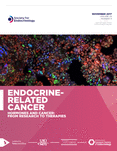The cellular and molecular mechanisms by which insulin influences breast cancer risk and progression
- Department of Surgery and Breast Cancer Research Program, Mary Babb Randolph Cancer Center, West Virginia University, PO Box 9238, Morgantown, West Virginia 26506, USA
- (Correspondence should be addressed to L Vona-Davis; Email: lvdavis{at}hsc.wvu.edu)
Abstract
Epidemiological studies have related hyperinsulinemia and type 2 diabetes to an increased breast cancer risk, an aggressive and metastatic phenotype, and a poor prognosis. Furthermore, diabetic retinopathy arises from pathological angiogenesis, which is also essential for breast cancer growth and metastasis. Insulin stimulates the proliferation of some human breast cancer cell lines in vitro by mechanisms that use both the phosphatidylinositol-3 kinase and the mitogen-activated protein kinase/Akt signaling pathways; it is also a cell survival (anti-apoptotic) agent and enhances tumor cell migration and invasive capacity. Hyperinsulinemia affects breast cancer cells via the endocrine system, but experimental studies suggest the importance of paracrine mechanisms operating by the effects of insulin on the secretion of adipokines from tumor-associated adipose tissue. In such a system, one adipokine, leptin, has stimulatory paracrine effects on breast cancer cell proliferation and survival, while a second, adiponectin, is inhibitory. Leptin, vascular endothelial growth factor, another insulin-regulated adipokine, and insulin itself also stimulate angiogenesis. Insulin has complex interactions with estrogens: it induces adipose stromal cell aromatase and tumor cell sex steroid hormone receptor expression and suppresses sex hormone-binding globulin, which may enhance estrogen synthesis and bioactivity with consequent promotion of estrogen-dependent breast cancer. All these actions influence the later steps in breast cancer development but genetic studies are also revealing connections between gene abnormalities related to type 2 diabetes and the initiation stage of breast carcinogenesis. Understanding the various mechanisms by which insulin participates in breast cancer cell biology provides opportunities for novel approaches to treatment.
- Revision received 27 August 2012
- Accepted 30 August 2012
- Made available online as an Accepted Preprint 30 August 2012
- © 2012 Society for Endocrinology












